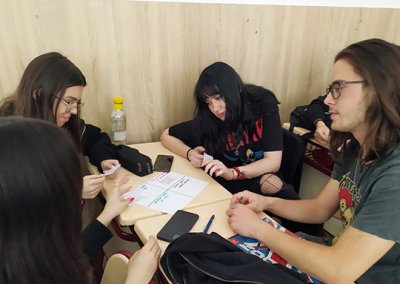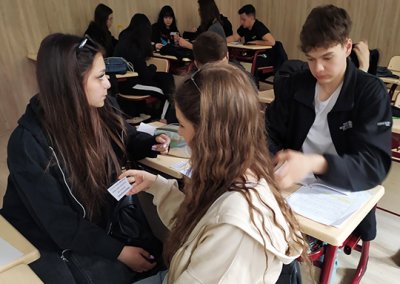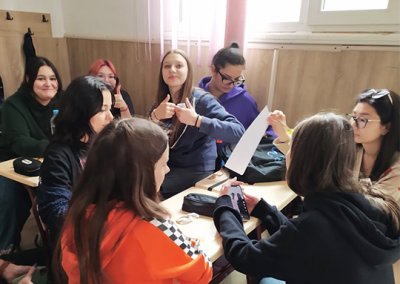How to get our of your Filter Bubbles
This was kind of an experimental workshop for us. For the first time since our team of volunteers started to do workshops in high schools, in January 2022, we were not four to prepare and present it in classes. As a duo, Doina and Théo created a workshop about Filter Bubbles.
You may already know the concept of Filter Bubbles. Popularized in 2014 by activist and entrepreneur Eli Pariser, it mainly designates a way of using social media online. On Facebook, Twitter or Instagram, most of us choose to only follow accounts and content/opinions that we already like or agree with. In a nutshell, our online comfort bubble that we tend to stick with, rather than confronting ourselves to contradictory opinions.
🧑🎓 We presented this workshop to two different classes from Mihai Eminescu high school in Constanta (class 9B and 10E), on the 10th and 11th of May, 2022.
Algorithms are not guilty, we are
At the beginning, we started by describing this concept to the students. More than only seeing content or information that you already like or agree with, Filter Bubbles also means that you are not conscious about it. Most of the time, you’re not locking yourself in it on purpose.
- 💬 “Opinion bubbles”: To only follow media outlets you already agree with, rather than confronting yourself to media opinions that might be contradictory.
- 👥 “Social bubbles”: For example, to only follow people that you already like and with the same social status, rather than confronting yourself to different lifestyles.
- 🎬 “Cultural bubbles”: To only watch movies you already know you will like, rather than forcing yourself to discover new genres you may not like.
Furthermore, we stated that this personal unique universe of information that we live in also exists in real life. Algorithms make it easier to create and maintain it, but they only exploit how our brains work.
Learning our cognitive biases
🧠 We made the students play an activity to learn how and why their brains create a filter bubble. Firstly, Théo displayed on the board six thoughts/decisions that your brain can have facing an information. For examples:
a) « Yeah this opinion makes sense to me, so it must be true »
b) « This is the more obvious answer, so no need to look further »
Then, after dividing the class in two or four groups, he gave them a sheet divided in six zones (a, b, c, d, e, f) and six papers. Each paper has one of our many brain biases written on it, with a short description. In our examples:
– Prefer information that confirm what you already believe (Confirmation Bias)
– Tend to stop to simple explanations if we can’t compare it (Less is Better Effect)
To win, they had to match every cognitive bias with the appropriate brain reaction. Surprisingly, even though most of them just learned about cognitive biases, almost all of them guessed correctly! 😲
Avoiding polarized opinions
After that, we quickly explained the long-term consequences of living in filter bubbles. Good ones, like spending less time on negative things or meeting people with the same interests. Bad ones, like lacking critical thinking or repeating the same mistakes.
Next, Doina let each group choose one of four controversial statements 🔥 :
- “Sensitivity and vulnerability are signs of weakness”
- “Russians are responsible of the war”
- “Zelenskyy is a national hero”
- “Roma people are uneducated”
✍️ She gave every student a paper to write his/her/they own opinion about it. Then, when everyone did, Doina asked the groups two exchange their opinions. Based on that, they had to write a group opinion that was nuanced and that took in account everyone’s opinion. This was a way to force them to avoid polarized opinion, where everyone is agreeing with the majority opinion.
➡️ In the end, it worked well: even the groups in which everyone had the same opinion had to identify everyone’s reasons and specificities, avoiding a positive or negative opinion. It forced them to be confronted with contrary opinions!
We hope they will keep those good habits to get out of their comfort zones in the future! 😊
Location: Mihai Eminescu high school, Constanța, Romania
Dates: 10th and 11th of May, 2022
Want to see more about our Erasmus events?
CLICK to see how our Erasmus events support participants increase knowledge and skills.
Build confidence | Recognize own abilities | Broaden horizons
Meet your needs in our European projects
CLICK to see which of our Erasmus Strategic Partnerships can help you the most and how you can benefit from them.
Social responsibility | Training opportunities | Online courses




